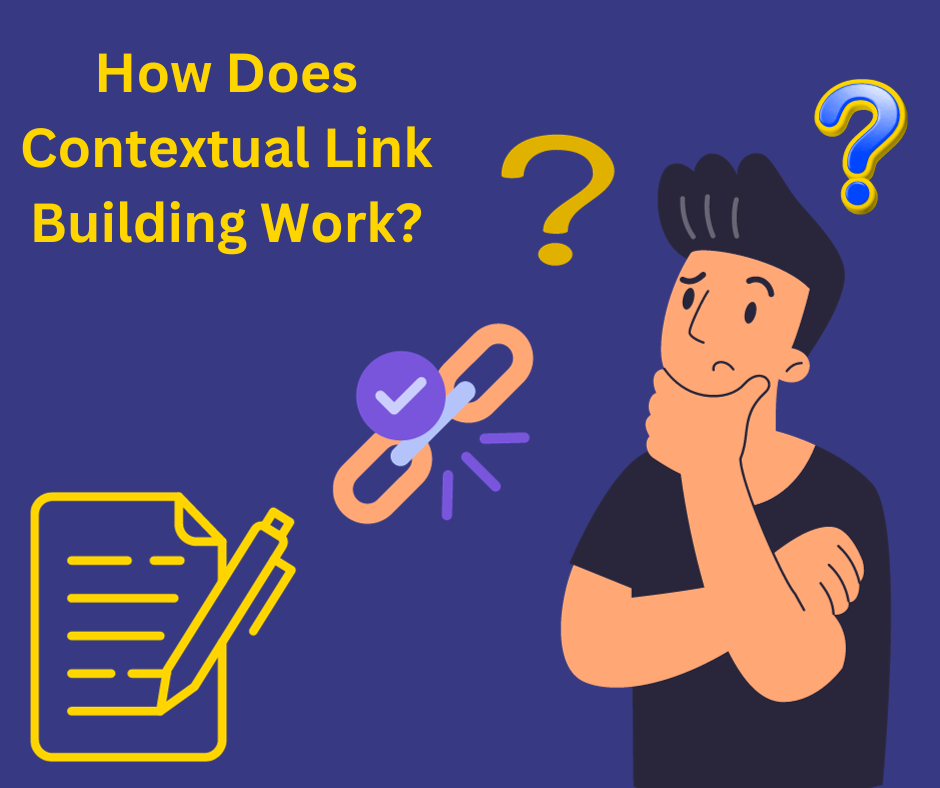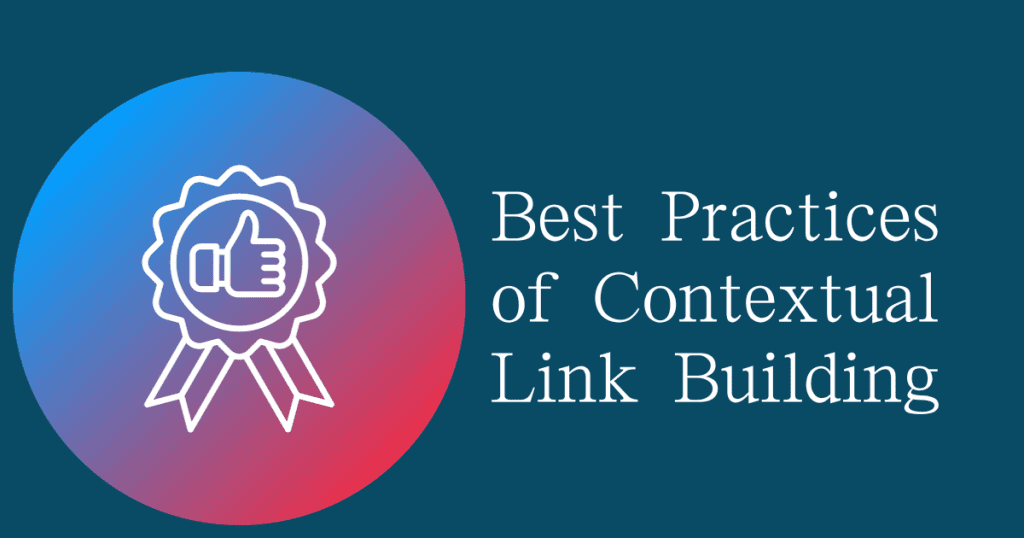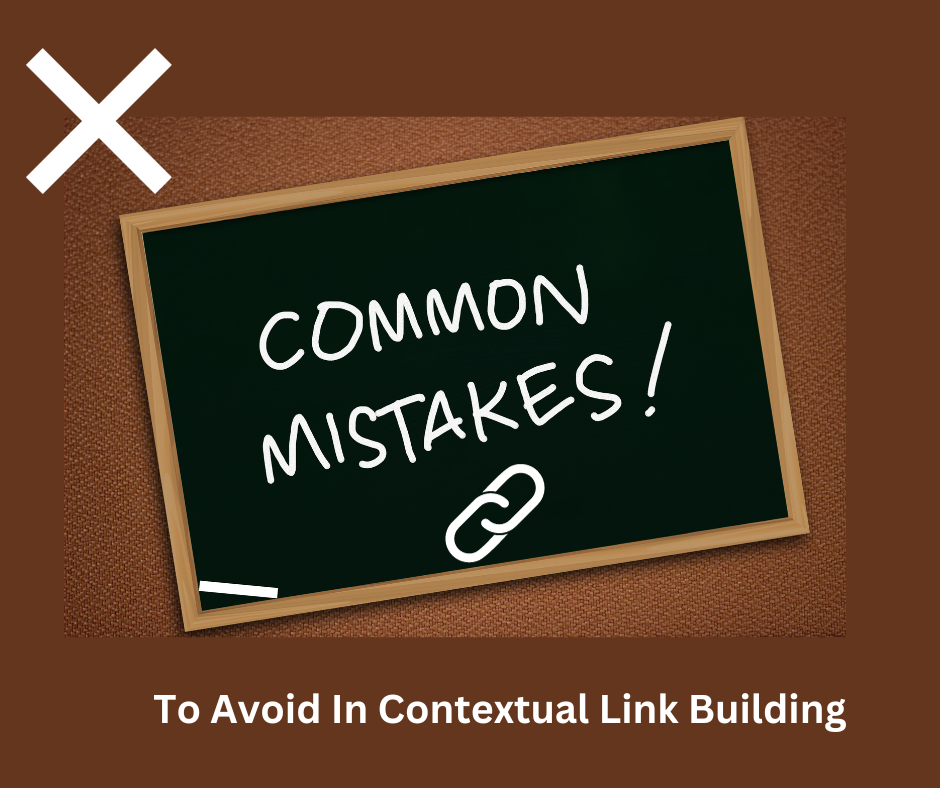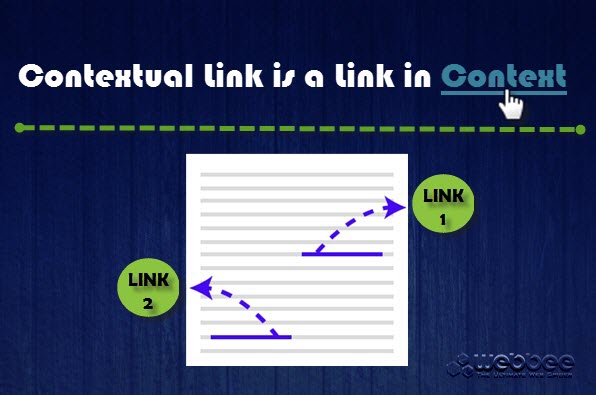Curious to know what is Contextual Link Building? According to search engine optimization (SEO), link building plays a crucial role in boosting a website’s visibility and authority. One of the most effective strategies is contextual link building, which involves acquiring links from reputable websites within the context of relevant content.
Unlike traditional link building techniques, contextual link building focuses on obtaining backlinks from high-quality sources that are contextually relevant to the linked site. This approach helps search engines recognize the credibility and relevance of the linked website, consequently improving its search engine rankings.
In this blog post we will explore the concept of contextual link building in more detail, outlining its benefits and providing insights into implementing this strategy effectively.
So, let’s delve into the world of contextual link building and unlock its potential for driving organic traffic and boosting online visibility.

The Importance Of Contextual Link Building
Contextual link building is crucial for enhancing website authority, improving organic search rankings, and increasing traffic and visibility. By strategically placing relevant links within the content, you can establish the context and relevance of your website to search engines. These contextual links provide valuable information and resources to users, making them more likely to stay on your site longer and explore other pages.
This leads to higher engagement and signals to search engines that your website is a reliable and authoritative source. As a result, your organic search rankings improve, driving more organic traffic to your site. Additionally, contextual link building helps you build relationships and connections with other websites in your industry, leading to potential collaborations and partnerships.
Overall, investing in contextual link building is essential for sustainable digital growth and achieving online success.
How Does Contextual Link Building Work?

Contextual link building is an essential SEO strategy that involves creating links within a relevant context. These links aim to provide valuable information to both the users and search engines by directing them to relevant content. Anchor texts play a crucial role in contextual links, as they provide context and keywords to the linked page.
Proper link placement is also important, as it affects the visibility and authority of the linked page. Links should be naturally placed within the content, avoiding any forced or spammy placement. By strategically incorporating contextual links, website owners can enhance their online visibility and improve their search engine rankings.
So, it is important to understand the concepts and methods behind contextual link building to leverage its benefits and drive organic traffic to your website.
Strategies For Effective Contextual Link Building
Contextual link building is an effective SEO strategy. By creating valuable and shareable content, you can attract backlinks from relevant websites. Building relationships with these websites can also help in acquiring contextual backlinks. Another strategy is to utilize guest blogging opportunities, where you can contribute content to authoritative sites and include contextual links back to your own website.
These contextual links not only drive traffic but also enhance your website’s credibility and authority in the eyes of search engines. It is important to focus on creating high-quality content that aligns with the interests and needs of your target audience.
This will increase the chances of other websites linking to your content naturally, resulting in improved search engine rankings and organic traffic. So, invest time and effort in contextual link building to boost your website’s online visibility and attract more visitors.
The Role Of Relevance In Contextual Links
The relevance between linking domains and target keywords plays a significant role in improving search engine rankings. Search engines consider contextual relevance when determining the value of a link. Understanding the connection between linking domains and target keywords is crucial for effective link building strategies.
Several key factors contribute to link relevance, such as the content of the linking page, anchor text, and the overall theme of the website. By focusing on contextual relevance, website owners can increase the authority and credibility of their pages.
This, in turn, can drive more organic traffic and improve search visibility. Overall, contextual link building is a vital SEO practice that can significantly impact the success of a website.
Best Practices For Contextual Link Building

Incorporating natural, non-spammy links is crucial to ensure your links are relevant and valuable. Diversifying anchor text helps maintain a balanced link profile and avoids any over-optimization penalties.
It is important to monitor and analyze link metrics regularly to identify potential improvements. By keeping a close eye on these metrics, you can make informed decisions about your link building practices. Remember, quality over quantity is key when it comes to contextual link building.
Providing valuable content and building relationships with other websites in your industry can help you earn high-quality contextual links.
Metrics To Measure Contextual Link Building Success
To measure the success, of contextual link building, you need to focus on metrics that provide valuable insights. Assessing website traffic and referral sources allows you to understand the impact of contextual links on driving visitors.
Monitoring keyword rankings and organic search visibility helps identify the effectiveness of your link building efforts in improving search engine rankings. Analyzing domain authority and backlink profiles reveals the quality and relevance of the links obtained. By tracking these metrics, you can gauge the performance of your contextual link building campaigns and make informed decisions to optimize your results.
Keep on top of these metrics to ensure the success of your contextual link building endeavors.
Common Mistakes To Avoid In Contextual Link Building

Contextual link building is an important aspect of SEO. However, there are common mistakes that should be avoided. Over-optimization and keyword stuffing are two such errors that can have negative consequences. It’s crucial to strike a balance between organic and relevant link building practices.
Engaging in link schemes or purchasing links is not a sustainable strategy and can lead to penalties from search engines. Quality and relevance of links cannot be ignored. It’s essential to focus on building high-quality backlinks from reputable sources that are relevant to your website or content.
By avoiding these mistakes and following best practices, contextual link building can significantly improve your website’s search engine rankings and organic traffic.
Future Trends In Contextual Link Building
As search engines continuously evolve their algorithms, link building strategies are also adapting to keep up with these changes. With the increasing importance of user experience and engagement signals, contextual link building has become more crucial than ever.
Rather than focusing solely on the quantity of backlinks, the emphasis has shifted towards obtaining high-quality links from websites that are contextually relevant to the content being linked. This trend ensures that the links are not only valuable for search engine rankings but also provide genuine value to users.
As a result, the future of contextual link building lies in creating meaningful connections between websites, enhancing user experience, and building relationships within relevant industries. This approach allows websites to establish authority and credibility, leading to improved organic rankings and increased organic traffic.
Read also
Curated Backlink Strategy
15 Ethical Link Building Strategies
Frequently Asked Questions On What Is Contextual Link Building
What Is Contextual Link Building?
Contextual link building is a strategy used in SEO to acquire backlinks from relevant and high-quality websites. It involves placing links within the content of a webpage that are naturally integrated and provide value to the reader. This helps improve search engine rankings and increase organic traffic to a website.
Why Is Contextual Link Building Important?
Contextual link building is important because it signals to search engines that a website is trustworthy and authoritative. It not only improves search engine rankings but also drives targeted traffic to a website. Furthermore, contextual links provide valuable information to the readers and enhance their overall user experience.
How Does Contextual Link Building Work?
Contextual link building works by placing links within the content of a webpage that are relevant to the topic and provide additional information to the reader. These links are integrated naturally and seamlessly, making them appear as a valuable resource to both the readers and search engines.
This helps build authority and increase visibility in search results.
What Are The Benefits Of Contextual Link Building?
Contextual link building offers several benefits such as improved search engine rankings, increased organic traffic, enhanced brand visibility, and improved user experience. It helps build authority and credibility for a website, as well as improves the chances of getting referral traffic from relevant websites.
How Can I Implement Contextual Link Building On My Website?
To implement contextual link building on your website, focus on creating high-quality content that naturally integrates relevant links. Conduct thorough research to identify credible websites for potential link placements. Reach out to website owners or bloggers to request contextual link placements or consider guest posting on relevant websites.
Are There Any Risks Associated With Contextual Link Building?
While contextual link building can be an effective seo strategy, there are some risks involved. If links are acquired from low-quality or spammy websites, it can lead to penalties from search engines. It is important to ensure that all links are relevant, natural, and add value to the reader’s experience.
Regularly monitor and assess your link profile to avoid any potential risks.
Conclusion
Contextual link building is a crucial strategy for achieving higher search engine rankings and driving organic traffic to your website. By incorporating relevant and informative links within the content, you are not only enhancing user experience but also signaling to search engines the authority and credibility of your website.
Contextual link building helps to establish your website as a valuable resource within a specific niche, attracting more targeted traffic and potential customers. Remember to focus on quality rather than quantity when it comes to building contextual links. Creating valuable, unique, and engaging content will naturally lead to other reputable websites linking back to your site.
As search engine algorithms become more sophisticated, it is essential to stay updated with the latest seo best practices to ensure your website remains competitive and visible in the online realm. Start implementing contextual link building strategies today, and watch your website soar in search engine rankings and organic traffic.





